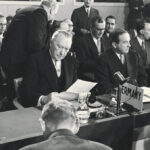It’s time once again to feature some of the smart conversations that occur around the country through the Eisenhower Series College Program. For over 50 years, the Eisenhower Program has reached out to colleges and town halls across the nation to introduce War College students to audiences that are often unfamiliar with members of the U.S. military. This episode features Nate Minott and Chris Powers as they discuss some of the newest threats to homeland security. Nate considers the modern consumer-grade drone and the problem of securing airspace over sporting events, concerts or any large gathering. It’s a timely concern as the world watches what drones can do on the battlefield. Chris discusses the potential threat of foreign buyers acquiring land in the United States as well as the militarization of civilian law enforcement.
[My son] ran cross country with them, and at one of the events, a drone, a simple quadcopter showed up and hovered above the start line. The announcers told them to leave, and then the race proceeded to just happen, and the drone just followed them…I was aghast at just the lackadaisical attitudes of everyone that day.
Podcast: Download
Subscribe: Apple Podcasts | Spotify | Amazon Music | Android | Pandora | iHeartRadio | Blubrry | Podchaser | Podcast Index | TuneIn | Deezer | Youtube Music | RSS | Subscribe to A Better Peace: The War Room Podcast
Nate Minott is a lieutenant colonel and an Army Air Defense Officer with 20 years of military service and numerous deployments. He has extensive experience with Air Defense weapons like the Patriot and Stinger. He also has experience developing advanced military capabilities through the Army acquisition process. He was a member of the Eisenhower Series College Program and is a graduate of the AY23 Resident Course at the U.S. Army War College.
Chris Powers is a lieutenant colonel Military Police Officer with over 23 years of service in the Missouri National Guard. He has deployed for Operation Noble Eagle in support of homeland security following the 9/11 attacks, Operation Iraqi Freedom, trained units in Panama and Poland, and responded to numerous state emergencies ranging from natural disasters to civil unrest. When not in uniform, Chris serves as the managing member of a law firm that specializes in real estate litigation and operates a beef cattle farm. Chris received his Juris Doctorate degree from the University of Missouri-Kansas City in 2007 and is licensed to practice law in multiple state and federal jurisdictions throughout the Midwest. He was a member of the Eisenhower Series College Program and is a graduate of the AY23 Resident Course at the U.S. Army War College.
Ron Granieri is Professor of History and the Chair of the Department of National Security and Strategy at the U.S. Army War College and the Editor of A BETTER PEACE.
The views expressed in this presentation are those of the speakers and do not necessarily reflect those of the U.S. Army War College, U.S. Army, or Department of Defense.
Photo Credit: U.S. Department of Agriculture





The title — and the content — of this podcast is/is about “Preserving Domestic Security.”
But what, exactly, is the overall/the overarching context, within which issues/matters relating to “preserving domestic security” today (such as those presented by LTC Minott, LTC Chris Powers and Prof. Ron Granieri above) need to be considered?
Stated another way, what has changed/what has become manifest — which causes the issues/the matters relating to “preserving domestic security” — for example as presented by LTC Minott, LTC Chris Powers, and Prof. Ron Granieri above — to become important today?
As to these such questions, might the following prove helpful?
“In this new world disorder, the power of identity politics can no longer be denied. Western elites believed that in the twenty-first century, cosmopolitanism and globalism would triumph over atavism and tribal loyalties. They failed to understand the deep roots of identity politics in the human psyche and the necessity for those roots to find political expression in both foreign and domestic policy arenas. And they failed to understand that the very forces of economic and social development that cosmopolitanism and globalization fostered would generate turbulence and eventually resistance, as ‘Gemeinschaft’ (community) fought back against the onrushing ‘Gesellschaft’ (market society), in the classic terms sociologists favored a century ago.” (See the Mar-Apr 2017 edition of “Foreign Affairs” and, therein, the article by Walter Russell Mead entitled “The Jacksonian Revolt: American Populism and the Liberal Order.”)
Final Question: Given the overall context/the overarching what has changed/become manifest suggestion — provided by Walter Russell Mead above — (a) as to restoring the trust and confidence of the American people in America’s military and in America’s local police forces, (b) how can this be done in such as way as to satisfy the wants, needs and desires of both America’s “Gemeinschaft” (communities) and America’s “Gesellschaft” (market society)?
Regarding the “how do we preserve domestic security” matters — that I present in initial comment immediately above — as to these such matters, let us consider a the matter of America needing to prevail over China (et. al) — in economic competition today — this requiring that America must prioritize the wants, needs and desires of Gesellschaft” (market society); this, over the wants, needs and desires of “Gemeinschaft (community). (This latter group, in fact, often being seen as those individuals and groups — and those states and societies — whose wants, needs and desires tend to stand in the way of necessary — market-based — competitive — political, economic, social and value development/change?)
As to this such thought, let us consider how the U.S./the West — in certain foreign nations — sees how and why our nation’s — and the host-nation’s — military, police and intelligence forces should be used — this, to (a) “preserve domestic security” (the title of our podcast here), in (b) certain “provide for political, economic, social and value change”/”provide for market-society/provide for ‘development’ ” times:
“a. An IDAD (Internal Defense and Development) program integrates security force and civilian actions into a coherent, comprehensive effort. Security force actions provide a level of internal security that permits and supports growth through balanced development. This development requires change to meet the needs of vulnerable groups of people. This change may, in turn, promote unrest in the society. The strategy, therefore, includes measures to maintain conditions under which orderly development can take place.” (See our own JP 3-22, Foreign Internal Defense; therein, see Chapter II, “Internal Defense and Development Program,” Paragraph 2, “Construct.”)
Bottom Line Question — Based on the Above:
My excerpt from JP 3-22 above suggests a certain “context”/certain conditions (Gesellschaft/market society versus Gemeinschaft/community — in an effort to achieve further political, economic, social and value “change”/”development”) in which such things as “preserving domestic security” (and, thus, the use of military, police and intelligence forces in the name of same?) (a) are to be discussed and (b) are to be viewed.
With regard to America preserving our own domestic security today (and the use of our military, police and intelligence forces to achieve same?) — for example in our competition with China, et. al — should we not, also, consider this exact same context (Gesellschaft/market society versus Gemeinschaft/community — in an effort to achieve further political, economic, social and value “development”/”change)?
Note that — when the U.S./the West, post-the Old Cold War, moved out smartly to “win” in “economic competition” terms — and, thus, of necessity as per this such mission, chose to prioritize the wants, needs and desires of Gesellschaft/market society over the wants, needs and desires of Gemeinschaft/community —
Note that — when this was done, ALL of the U.S./the West’s opponents/competitors/enemies could, if they chose, (a) present/declare themselves to be the defenders/the champions/the protectors of Gemeinschaft/community wants, needs and desires throughout the world — and even these such wants, needs and desires of our people here at home in the U.S./the West.
Now to ask yourself: Just how horribly did and does this such development (see my second paragraph above) effect the ability of the U.S./the West — and/or other “progressive” countries — to (a) “preserve domestic security;” this, while (b) trying to “win” the economic competition “wars?”
In partial answer to the concluding question — in my comment immediately above (see “Now to ask yourself: Just how horribly …”) — consider how the following came to adversely effect “preserving domestic security;” this, in “progressive” countries who came to believe that they needed to — for national security reasons — prioritize Gesellschaft/market society over Gemeinschaft/community:
“As Putin passes his 20th year as Russia’s president, his domestic and foreign policy appears intended to contrast his country’s ‘independent path’ with the liberal and decadent regimes in the West. The invented battle of Western values versus Russia’s ‘traditional values’ is part of a Kremlin effort to justify its broader actions in the eyes of Russian citizens, placing them in the context of a global struggle in which Russia is the target of aggression. Ignoring and violating the provisions of international organizations to which it is a party thus becomes a demonstration of defending its conservative values from European liberalism. … ” (See the Wilson Center publication “Kennan Cable No. 53” and, therein, the article “Russia’s Traditional Values and Domestic Violence,” by Olimpiada Usanova, dated 1 June 2020.)
“Liberal democratic societies have, in the past few decades, undergone a series of revolutionary changes in their social and political life, which are not to the taste of all their citizens. For many of those, who might be called social conservatives, Russia has become a more agreeable society, at least in principle, than those they live in. Communist Westerners used to speak of the Soviet Union as the pioneer society of a brighter future for all. Now, the rightwing nationalists of Europe and North America admire Russia and its leader for cleaving to the past.” (See “The American Interest” article “The Reality of Russian Soft Power” by John Lloyd and Daria Litinova.])
“Compounding it all, Russia’s dictator has achieved all of this while creating sympathy in elements of the Right that mirrors the sympathy the Soviet Union achieved in elements of the Left. In other words, Putin is expanding Russian power and influence while mounting a cultural critique that resonates with some American audiences, casting himself as a defender of Christian civilization against Islam and the godless, decadent West.” (See the “National Review” item entitled: “How Russia Wins” by David French.)